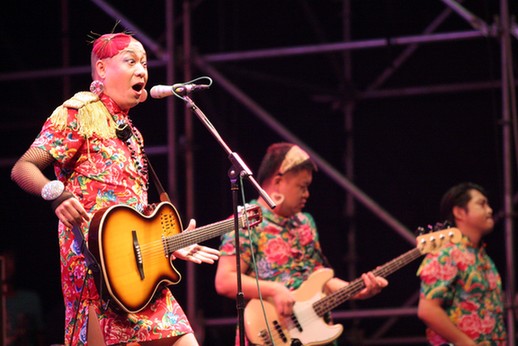Life
A combination of rock 'n' shock
(China Daily)
Updated: 2010-12-24 08:19
 |
Large Medium Small |
|
 The flamboyant lead singer Liang Long performs with his band Second Hand Rose. Xie Yu / for China Daily |
The first thing you notice about Liang Long, the lead singer of Second Hand Rose, is his bald head, flame-red lips, red high heels and his coarse voice.
Off stage, the 180-meter, 34-year-old, sans make-up, bears no resemblance to his on-stage persona. But once he starts talking, his sharp tongue and wit leave no doubt that this is indeed Liang.
"Some people wonder whether I am male or female," he laughs loudly, recalling the long hair, skirts and leggings that he sported on stage in his early years. "When I shaved my head, some even asked if I had gone crazy.
"But I don't care what they say. I know that whenever we are on stage, there are loud cheers and applause. That's what we want," he says.
The performer claims his image is inspired by his hometown, Harbin, in Northeast China's Heilongjiang province. With his flashy costumes and equally flashy accessories, he has been a big topic of discussion in music circles since he founded the band back in 1999. Their music borrows largely from errenzhuan, a popular folk music style in the northeast.
The name of the band came to Liang in 1999 and is aimed at mocking the blind copying of Western music by some Chinese musicians. "We put secondhand in the band name to keep us alert," he explains.
As to their humorous lyrics, Liang says they draw from his two failures in Beijing. Harboring a dream of having his own band since high school, Liang's first job was security guard, thanks to his tall, strong frame. When he lost that job, Liang decided to fulfill another dream and come to Beijing.
"My first and second attempts in Beijing, around 1996 and 1997, made me depressed. There was no rock music then and people were mostly interested in pop music produced in Hong Kong and Taiwan," he recalls. To make ends meet, he took on a host of odd jobs, from selling cosmetics to giving tourists bicycle rides, all the while writing music in his spare time. Missing his hometown, he came up with the idea of integrating errenzhuan and his music.
"I've always turned to rock to express myself but errenzhuan is what I grew up with. So I combined the two," Liang says.
Accompanied by four like-minded friends, who share Liang's peculiar taste in outfits, the band soon became active at Beijing live music venues such as Nameless Highland and Lucky Bar, in the 1990s.

Liang says their first show in Harbin was a sensation and their unique style ensured similar success for their first show at Beijing's Lucky Bar.
"No one can really categorize our music style but us, the most important thing is we are able to reach our listeners," Liang says.
Their songs, that are mostly about youth, life's pressures and social problems, speak to their fans.
According to Liang, who has written most of the band's songs since their first album in 2004, lyrics form the core of all music.
"I go home often, even though we are on the road nearly 15 days a month. That is because I want to chat with the locals, especially in the villages. They always come up with new words which are clever and funny," he says.
One of the band's key members is Wu Zehun, a suona player. Wu met Liang when he performed in Tianqiao, an area of Beijing that is home to many folk musicians.
"The traditional Chinese instruments add a loud, cheerful effect to our music," Liang says.
The band will celebrate their 10th anniversary on Jan 2 at Starlive. Asked about how they have evolved, Liang admits that his early works were quite cynical and harsh. He now wants to make them more uplifting. "I just want to have a good time with the audience," he says.
"Some say Chinese rock music is dead. I disagree. We have so many musical forms in the country such as errenzhuan that can add color to rock music. Although some see it as vulgar and too localized, I believe it will last forever," he shouted to the crowds at this year's three-day Midi Music Festival in Zhenjiang, Jiangsu province, which attracted more than 50,000 fans every day.
"Folk music has been passed on from generation to generation through the centuries, which proves its power. It has a much wider reach than any pop song," he says.